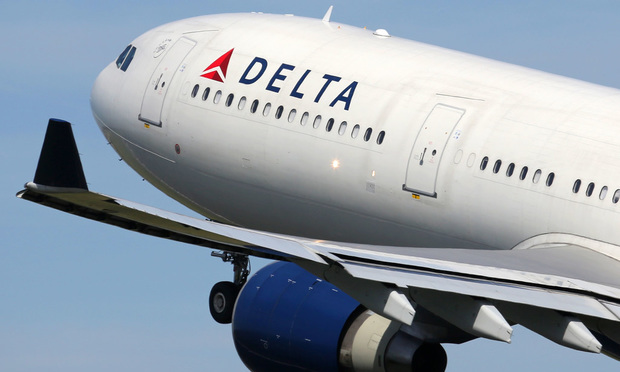Liability Questions Loom in Delta Vendor Breach
In the event of a third-party breach, multinational corporations such as Delta potentially face breach notification requirements in multiple states.
April 06, 2018 at 02:55 PM
5 minute read

A data breach last year at California-based customer support service [24]7.ai may have exposed the credit card information of customers of Sears, Kmart and Atlanta-based Delta. These organizations are now faced with the task of sorting through potential liability stemming from state data breach notification laws and the role of third-party vendors in data exposure.
In a press statement issued on April 4, Delta announced that it had been made aware of the breach on March 28 and had begun working with [24]7.ai to get a sense of the breach's scope and impact. Delta also reportedly contacted federal law enforcement and forensic teams to confirm the breach and has launched a website to answer consumer questions about the breach.
Georgia is one of 47 U.S. states with breach notification laws on the books requiring companies to notify consumers in a timely fashion if state residents have had their data exposed by a breach. Efraim Harari, general counsel at cybersecurity technology company SentinelOne, noted, however, that national companies such as Delta are likely subject to even more stringent state breach notification laws.
“Delta Airlines probably has more customers in California, where their breach notification law is far beyond that, with credit monitoring for one year and a few other requirements, as is the case for Massachusetts,” Harari noted.
Because of the kind of data Delta retains, Harari said the potential to draw consumer concern is likely higher than it could be in a similar breach of a technology or data company. “Companies like Delta have a different problem in the sense that the type of data they process is highly personal and has immediate personal implications when it's been breached, specifically credit card information, Social Security information, things that can lead to fraud pretty quickly,” he noted.
“The reputational risk is paramount,” Harari said of data breaches more generally. “It causes serious damage to companies vis-à-vis their shareholders, their boards, their executives,” he noted.
Harari guessed that Delta, given its longevity in the market and size, probably mandates fairly strict data obligations for its data processors, meaning that a smaller tech vendor such as [24]7.ai is more likely to be held liable for data exposure. Companies smaller than Delta, however, may not have the same negotiating weight in establishing liability with their vendors, which could leave them exposed to litigation.
U.S. data privacy law, Harari said, hasn't fully resolved the question of whether users need to expressly consent (or opt in) to having organizations share their data, or whether organizations can simply share data unless users express otherwise (or opt out). He expects, however, that this may not always be the case.
“I do predict some shifts at some point in the U.S. toward a more opt-in option with respect to sharing with third parties, especially third parties whose activities with respect to the data are not what the user has signed up for,” he said.
Third-party breaches seem to be an increasingly common staple of corporate cybersecurity risks. An exposure of Verizon Communications' data last year was traced back to a third-party data storage center, as was an earlier breach at retailer Target.
Paul Sieminski, general counsel at WordPress' parent company Automattic, previously told Corporate Counsel that even when vendor systems are breached, organizations should approach the situation as if they are liable for consumer data loss. “I always feel that we're ultimately responsible for [our data] and when we choose partners, we can't wash our hands of it,” he noted. “A user whose account was breached is not going to accept: 'Oh, that wasn't us.'”
“[Vendors] are responsible for their own security practices and if there is a breach, if they failed in those obligations, they should bear responsibility for it. But you as the customer are responsible for selecting good partners,” Sieminski added.
Delta noted in a statement that the company would “directly contact customers who may have been impacted by the [24]7.ai cyber incident.”
“In the event any of our customers' payment cards were used fraudulently as a result of the [24]7.ai cyber incident, we will ensure our customers are not responsible for that activity,” the company added.
According to Delta, customer payment information may have been exposed by the breach, but passports, government IDs, security and SkyMiles for Delta customers were not impacted. The company plans to directly contact customers who may have been impacted by the breach and “will ensure our customers are not responsible for that activity.”
A statement issued by [24]7.ai noted that the breach occurred from Sept. 26 to Oct. 12, 2017.
Georgia has played host to a number of high-profile data breaches over the last few years, many of them exposing personal information for millions of consumers. A 2014 breach of a third-party vendor for Atlanta-based home improvement chain Home Depot impacted more than 56 million customers, and resulted in around $85 million in settlement fees for the company. Atlanta-based credit reporting company Equifax, which exposed data for over one-third of all U.S. residents, is now facing a whole slew of litigation around the handling of its breach.
This content has been archived. It is available through our partners, LexisNexis® and Bloomberg Law.
To view this content, please continue to their sites.
Not a Lexis Subscriber?
Subscribe Now
Not a Bloomberg Law Subscriber?
Subscribe Now
NOT FOR REPRINT
© 2025 ALM Global, LLC, All Rights Reserved. Request academic re-use from www.copyright.com. All other uses, submit a request to [email protected]. For more information visit Asset & Logo Licensing.
You Might Like
View All

On The Move: Ex-Partner Returns to Lead Nelson Mullins Corporate Group, Burr & Forman Hires University GC as COO
5 minute read
Law Firm Sued for Telemarketing Calls to Customers on Do Not Call Registry

Evidence Explained: Prevailing Attorney Outlines Successful Defense in Inmate Death Case
Trending Stories
- 1We the People?
- 2New York-Based Skadden Team Joins White & Case Group in Mexico City for Citigroup Demerger
- 3No Two Wildfires Alike: Lawyers Take Different Legal Strategies in California
- 4Poop-Themed Dog Toy OK as Parody, but Still Tarnished Jack Daniel’s Brand, Court Says
- 5Meet the New President of NY's Association of Trial Court Jurists
Who Got The Work
J. Brugh Lower of Gibbons has entered an appearance for industrial equipment supplier Devco Corporation in a pending trademark infringement lawsuit. The suit, accusing the defendant of selling knock-off Graco products, was filed Dec. 18 in New Jersey District Court by Rivkin Radler on behalf of Graco Inc. and Graco Minnesota. The case, assigned to U.S. District Judge Zahid N. Quraishi, is 3:24-cv-11294, Graco Inc. et al v. Devco Corporation.
Who Got The Work
Rebecca Maller-Stein and Kent A. Yalowitz of Arnold & Porter Kaye Scholer have entered their appearances for Hanaco Venture Capital and its executives, Lior Prosor and David Frankel, in a pending securities lawsuit. The action, filed on Dec. 24 in New York Southern District Court by Zell, Aron & Co. on behalf of Goldeneye Advisors, accuses the defendants of negligently and fraudulently managing the plaintiff's $1 million investment. The case, assigned to U.S. District Judge Vernon S. Broderick, is 1:24-cv-09918, Goldeneye Advisors, LLC v. Hanaco Venture Capital, Ltd. et al.
Who Got The Work
Attorneys from A&O Shearman has stepped in as defense counsel for Toronto-Dominion Bank and other defendants in a pending securities class action. The suit, filed Dec. 11 in New York Southern District Court by Bleichmar Fonti & Auld, accuses the defendants of concealing the bank's 'pervasive' deficiencies in regards to its compliance with the Bank Secrecy Act and the quality of its anti-money laundering controls. The case, assigned to U.S. District Judge Arun Subramanian, is 1:24-cv-09445, Gonzalez v. The Toronto-Dominion Bank et al.
Who Got The Work
Crown Castle International, a Pennsylvania company providing shared communications infrastructure, has turned to Luke D. Wolf of Gordon Rees Scully Mansukhani to fend off a pending breach-of-contract lawsuit. The court action, filed Nov. 25 in Michigan Eastern District Court by Hooper Hathaway PC on behalf of The Town Residences LLC, accuses Crown Castle of failing to transfer approximately $30,000 in utility payments from T-Mobile in breach of a roof-top lease and assignment agreement. The case, assigned to U.S. District Judge Susan K. Declercq, is 2:24-cv-13131, The Town Residences LLC v. T-Mobile US, Inc. et al.
Who Got The Work
Wilfred P. Coronato and Daniel M. Schwartz of McCarter & English have stepped in as defense counsel to Electrolux Home Products Inc. in a pending product liability lawsuit. The court action, filed Nov. 26 in New York Eastern District Court by Poulos Lopiccolo PC and Nagel Rice LLP on behalf of David Stern, alleges that the defendant's refrigerators’ drawers and shelving repeatedly break and fall apart within months after purchase. The case, assigned to U.S. District Judge Joan M. Azrack, is 2:24-cv-08204, Stern v. Electrolux Home Products, Inc.
Featured Firms
Law Offices of Gary Martin Hays & Associates, P.C.
(470) 294-1674
Law Offices of Mark E. Salomone
(857) 444-6468
Smith & Hassler
(713) 739-1250






